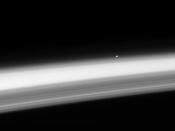Using present day technology, the farthest a human might reach is the gas giant Jupiter. It takes twenty two months to reach Jupiter. However, it would take 4 years and 2 months, considering coming back. I think this is just the right amount an average astronaut should stay in space. This is because living in space for many months is rather frustrating as it is in an environment with the near absence of gravity. Living would be hard as you would have to follow a very strict, set routine.
The main reason humans would want to visit other planets in our solar system is possible human civilization. Humans want colonize other worlds. Another reason is that humans want to locate living intelligent specimens, which statistically already exist. The objective of this is study the daily life and structure of these living specimens. It is also possible that humans want to visit other planets, not for living specimens, but fossils.
Yes, it is possible that Alpha Centauri has a planetary system. Alpha Centauri is a star scientists have included in their search for extra solar planets. The reason a planetary system would be difficult to detect is because the techniques used to find extra solar planets require very large planets orbiting very close to their parent stars. Obviously, Alpha Centauri is contrasting to that making it harder to detect planets.
Figuratively, aliens exits. I think aliens, especially a race commonly referred to as the 'grays', exist around the 4th planet around Zeti Reticuli 2, in the Zeti Reticuli star system. This is because Zeta Reticuli is a binary system, consisting of stars Zeta 1 and Zeta 2, which orbit one another over long time periods. They are sun-like and located around 40 light years from Earth. At around 8 billion years old, they are significantly older than our own 5-billion year old sun, allowing time for a more complex civilization and technology to have evolved there.
No, it is not possible for one of today's space craft to travel to andromeda as it takes 2.2 millions years to get there at light speed (300 000km/s). To make it possible to travel to andromeda is freezing people until they can be thawed out later. Theoretically, this is difficult since water expands when it freezes which means people's cells explode as the ice crystals form. However, Geneticists are working on finding the gene that allows the body's cells to produce an antifreeze molecule that can help the organism survive the freezing process and make it possible to reach andromeda. Einstein predicted and it has been experimentally demonstrated that time slows down as you approach the speed of light. This theory is the root to another possible way of reaching andromeda. If velocity is increased, not only is time stretched so that a person's life lasts longer but distance is also shrunk so that the distance traveled would be perceived as being shorter. The only other two ways around this problem is to alter the space-time continuum so that the distance ahead of the ship is contracted while the distance behind the ship is expanded. This can only be achieved by gravitational waves generated by an engine. The pressure needs to vary so that gravitational waves of the correct magnitude and frequency are achieved. This is recognized as a warp engine and a mathematician has already calculated the frequency and magnitude of gravitational waves required to achieve such "warp" velocities. The other alternative is if two black holes of the right size can be linked to create a worm hole. This might occur somewhere naturally or it might be artificially generated. This could greatly reduce the journey time. Using a worm hole as a method of traveling huge distances is possible but might take time as research has not been completed into the possibility of worm hole travel.
Science may well give us good things. But why bother spending all this money exploring space when these same great minds could be applied to finding better ways to power humanity's greedy desire for energy, to feeding the starving millions around the globe, and generally making life down here better, before looking into new human civilizations. The needs of humanity should always come first. While there are people on Earth who need help, they should be helped, rather than seeing money spent on sending robots onto other planets.
http://www.astronomy.org.au/ngn/engine.php





